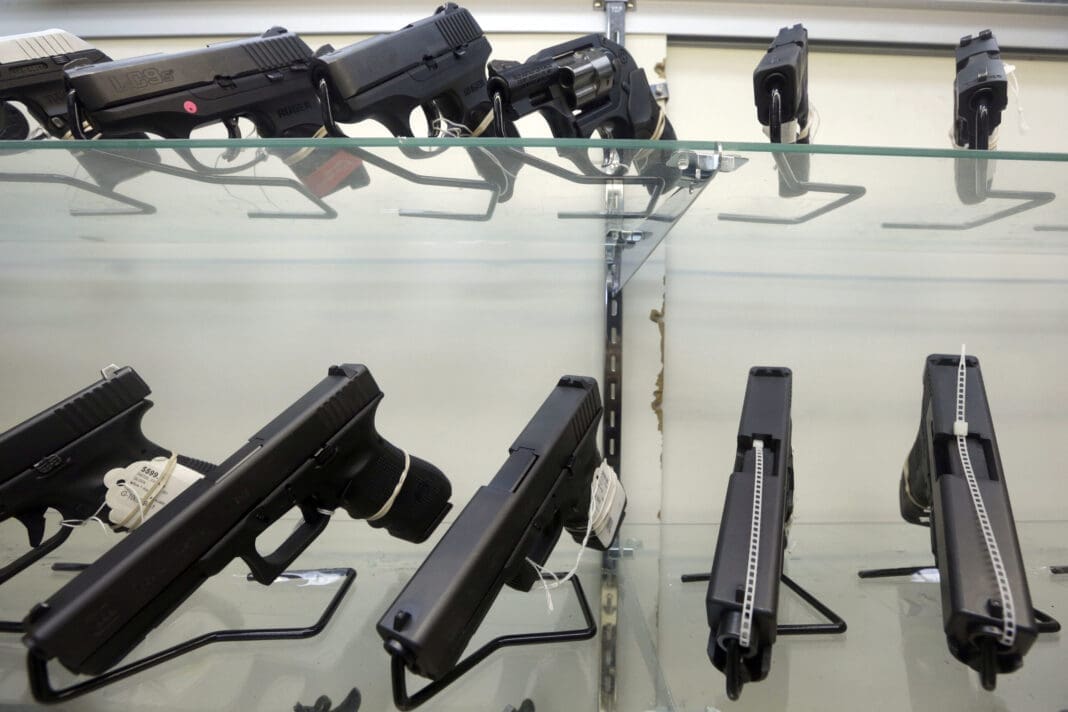Slate of gun safety bills introduced after Lewiston shooting advance to full Legislature
Maine legislators split mostly along party lines to back bills for a waiting period, background checks, and limits on rapid firing devices

Despite pushback from Republicans on the Legislature’s Judiciary Committee, the majority of members ultimately decided to recommend moving forward with the bill Gov. Janet Mills put forward in the wake of the Lewiston mass shooting to address mental health and attempt to keep guns out of the hands of dangerous people.
That bill was part of a slate of gun safety legislation proposed by Democrats that was backed by a majority of the committee. A proposal to create a process for someone to voluntarily waive their right to purchase a firearm was amended into a study and advanced by the committee last week. The other two measures would impose a 72-hour waiting period after the purchase of a firearm and would require all forfeited firearms to be destroyed as well as change the definition of a machine gun to align with the federal definition.
Background check policy too expansive for Republicans
The version of Mills’ gun bill (LD 2224) that the committee backed Wednesday included technical language changes, including the definition of an advertisement to clarify which sales would be newly subject to background checks. Democrats emphasized that it was not the intent for individual, private conversations to be considered advertisements, but rather a broadcast to a larger audience.
Multiple Republican committee members maintained concerns over the bill being too similar to a universal background check requirement, which failed by fewer than 30,000 votes in a 2016 ballot referendum question.
“This is sort of a slap in the face to the voters of Maine, in my opinion,” said Rep. David Haggan (R-Hampden).
Many of them — including Sen. Eric Brakey (R-Androscoggin), who said background checks provide “an illusion of safety” — claimed a universal background check could eventually lead to a gun registry that could be used to someday confiscate firearms. Proponents of the bill reiterated that LD 2224 is different from a universal policy by allowing for exceptions.
Brakey did, however, say the mental health component of Mills’ bill was its “redeeming quality.” This includes creating a network of crisis receiving centers to provide prompt and much-needed mental health care for Mainers.
The committee supported the bill in an 8-6 party-line vote.
Forfeiture, machine gun definition
Also receiving some technical amendments for language and consistency, LD 2086, which updates the definition of “machine gun” to align with the federal definition in order to limit their use, was also supported 8-6.
“As a Libertarian, I support the right of gay married couples to protect their cannabis plants with fully-automatic machine guns,” Brakey added just before the vote.
Bill sponsor and Senate co-chair of the committee, Sen. Anne Carney (D-Cape Elizabeth), underscored that the proposal does not ban semi-automatic weapons. She also said the language in the bill is intended to limit devices of a certain function, not by a specific brand or colloquial name, like “bump stocks.”
The bill would prohibit semi-automatic weapons that are turned into machine guns, defined as a firearm that can release multiple projectiles with a single trigger pull.
But Rep. Jennifer Poirier (R-Skowhegan) said firearms are not the issue, but rather “the people behind the trigger.”
Dems split on 72-hour waiting period exemptions
Discussion of LD 2238, the bill proposing a 72-hour waiting period after the purchase of a firearm, centered around an amendment from Rep. Adam Lee (D-Auburn) to create certain exemptions.
Those exemptions would include the same transactions that are excluded from background checks outlined in Mills’ bill, namely sales between family members and others specified as relics, antiques or other collectors’ items.
That bill was recommended by the committee in a 7-6 vote.
However, Lee’s Democratic colleagues did not support another proposed exemption for people who have a protection from abuse order. Lee as well as Passamaquoddy Tribal Rep. Aaron Dana voted for a version of the bill that included this exemption.
Although he supported each of the gun bills, Lee said he often feels torn on the issue.
“I feel like one side is often too sanguine about the risks that firearms pose, while the other side tends to be a little too dismissive of their potential as effective self-defense weapons,” Lee said. “My amendments were attempting to capture a middle ground there.”
He acknowledged that firearms can pose a risk, especially in a domestic violence situation, but he did not want to “foreclose an option” for people who use a firearm to defend themselves.
During the public hearing, the Maine Coalition to End Domestic Violence testified that the waiting period would not cause victims to be less safe. Executive Director Francine Garland Stark said the presence of a firearm increases the potential for the situation to turn deadly. If a victim feels they need a firearm to protect themselves, Stark said there are services that could keep them safe during the waiting period.
This story was originally published in the Maine Morning Star
Recommended

Democrats regain full control of state House with two special election wins
In special elections on Tuesday, state House Democratic candidates Peter Herzberg and Mai Xiong scored victories in two Southeast Michigan districts to help secure a 56-54 voting majority for their caucus.
By Ken Coleman, Michigan Advance - April 17, 2024
Colorado House approves historic ban on ‘assault weapons’
Measure, opposed by every Republican and 9 Democrats, heads to Senate
By Sara Wilson, Colorado Newsline - April 14, 2024
Maine House censures two GOP members for blaming mass shooting on abortion law
‘Your remarks were extremely offensive and intentionally harmful to the victims and the families of the Lewiston tragedy, the House of Representatives, and the people of Maine,’ wrote Speaker Talbot Ross
By Evan Popp, Maine Morning Star - April 11, 2024










































































